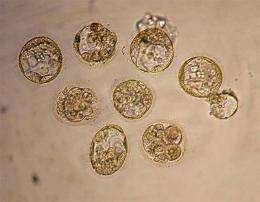S.Korea scientists clone pig for human transplants

South Korean scientists said they have cloned a piglet whose organs were genetically modified to make them more suitable for human transplants.
Lead scientist Lim Gio-Bin said the cloned piglet, born on April 3, had been genetically altered to lack the "alpha-gal" gene which triggers tissue rejection.
He said his government-sponsored team, involving scientists from four universities and two research institutes, used stem cells of smaller-than-normal pigs to clone "mini-pigs" with modified genes.
Immuno-rejection has been a major hurdle in human organ transplants.
Pig organs are well suited for transplantation but are coated with sugar molecules that trigger acute rejection in human bodies. Human antibodies attach themselves to such molecules and quickly destroy the transplanted pig organ.
"Our team produced four cloned mini-pigs from about 100 surrogate pigs but only one male named Xeno survived," Lim told AFP, adding his team is now working to produce a female piglet.
"Through mating we will be able to produce many genetically modified mini-pigs whose organs are more suitable for xenotransplantation (transplantation between different species)," he said.
In cloning Xeno, the scientist said his team adopted almost identical technology to that used by US scientists in 2002 to create cloned piglets, in which one copy of the sugar-producing gene was "knocked out."
An organism receives two copies of a gene, one from the mother and one from the father. Scientists have tried to produce pigs lacking both copies, so far unsuccessfully.
"Through our achievement South Korea became the second country in the world to clone such piglets after the United States," Lim said.
"I believe our methods are slightly better. Xeno will help us accumulate technology and resources, which can be used to produce many mini-pigs of good quality."
Lim said his team would conduct clinical trials on humans in 2012 and he believed genetically modified mini-pigs could be used commercially around 2017.
(c) 2009 AFP















